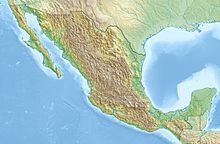Sistema Sac Actun
| Sistema Sac Actun | |
|---|---|

Gran Cenote
|
|
| Location in Mexico | |
| Location | Tulum Municipality, Quintana Roo, Mexico |
| Coordinates | 20°14′47.6″N 87°27′50.8″W / 20.246556°N 87.464111°WCoordinates: 20°14′47.6″N 87°27′50.8″W / 20.246556°N 87.464111°W |
| Depth | 101.2 meters (332 ft) |
| Length | underwater: 230.775 kilometers (143.397 mi) total: 319.021 kilometers (198.230 mi) |
| Discovery | November 26, 1987 |
| Geology | Limestone |
| Entrances | 170 Cenotes |
| Difficulty | Advanced cave diving |
Sistema Sac Actun (from Spanish and Yucatec Maya meaning "White Cave System") is an underwater cave system situated along the Caribbean coast of the Yucatán Peninsula with passages to the north and west of the village of Tulum. Exploration started from Gran Cenote 5 kilometers (3.1 mi) west of Tulum. The whole of the explored cave system lies within the Municipality of Tulum (state of Quintana Roo).
In early 2007, the underwater cave Sistema Nohoch Nah Chich was connected into and subsumed into Sac Actun making it the longest surveyed underwater cave system in the world. 'Sistema Naranjal' cave complex is also related.
Sac Actun measures 230.8 kilometers (143.4 mi) (after connecting Sistema Aktun Hu with 34 kilometers (21 mi) in January 2011) and is only surpassed by Sistema Ox Bel Ha at 256.7 kilometers (159.5 mi). Since early 2007, these two caves frequently exchanged the title of the longest Quintana Roo Speleological Survey underwater cave system in the world. Including connected dry caves and Sistema Dos Ojos makes Sistema Sac Actun with 319 kilometers (198 mi) the longest cave in Mexico and the second longest worldwide.
In March 2008, three members of the Proyecto Espeleológico de Tulum and Global Underwater Explorers dive team, Alex Alvarez, Franco Attolini, and Alberto Nava, explored a section of Sistema Aktun Hu known as the pit Hoyo Negro. At a depth of 57 meters (187 ft) the divers located the remains of a mastodon as well as at 43 meters (141 ft) a human skull that might be the oldest evidence of human habitation in this area to date. Additional bones were located and the skeleton was later identified as that of a teenaged female now referred to as Naia.
...
Wikipedia

